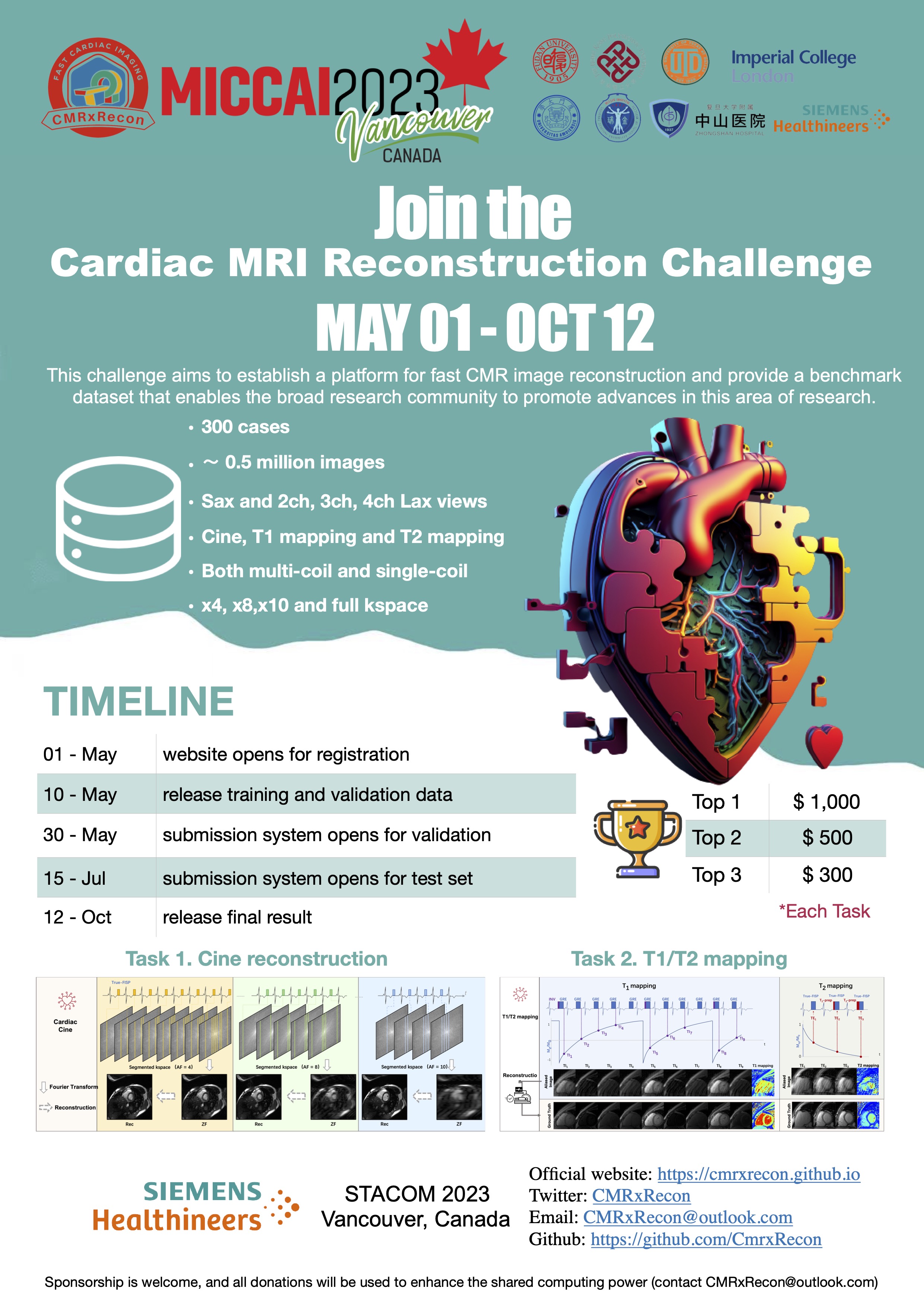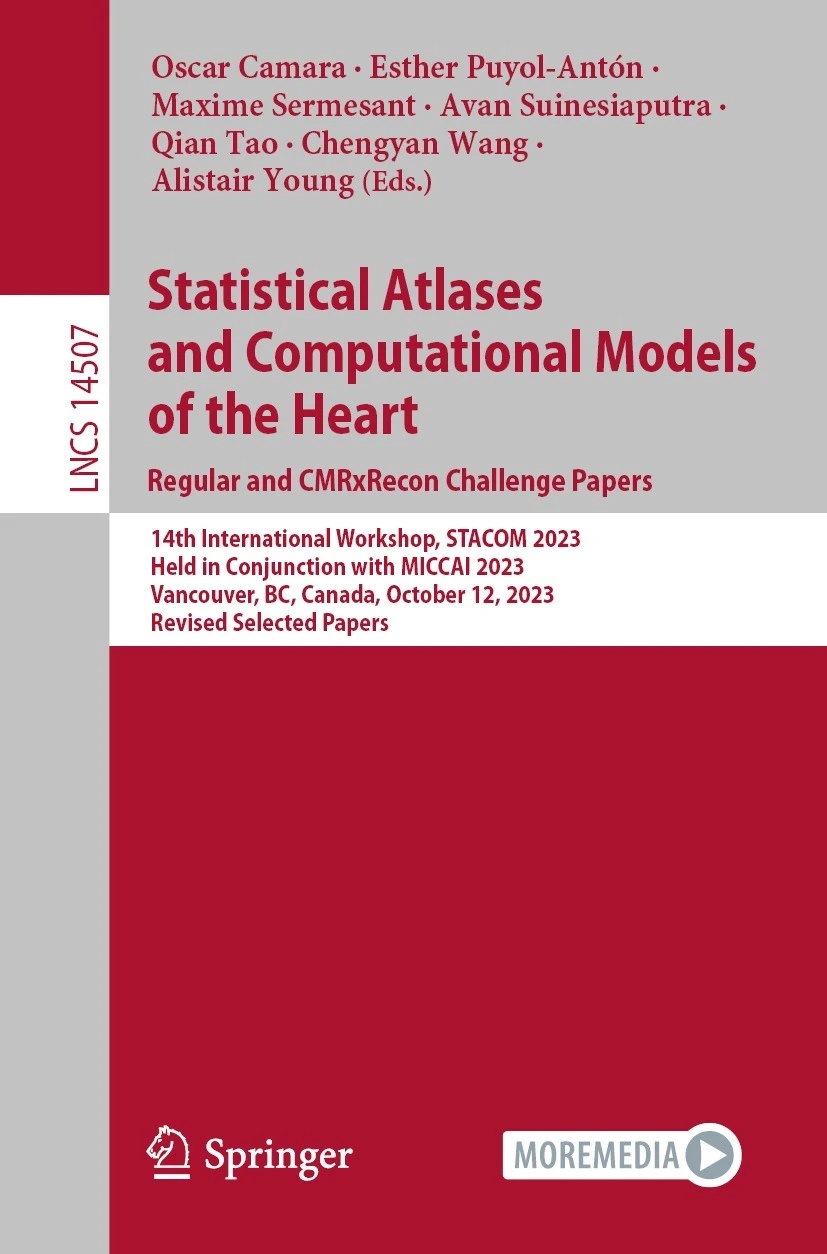The Statistical Atlases and Computational Modeling of the Heart (STACOM) workshop has been running annually at MICCAI since 2010. The 14th edition of STACOM workshop is going to be held in conjunction with the MICCAI 2023 in Vancouver, Canada. The STACOM workshop is aiming to create a collaborative forum for young/senior researchers (engineers, biophysicists, mathematicians) and clinicians, working on: statistical analysis of cardiac morphology and dynamics, computational modelling of the heart and fluid dynamics, data/models sharing, personalisation of cardiac electro-mechanical models, quantitative image analysis and translational methods into clinical practice.
:: Poster Teasers ::
Schedule
The STACOM 2023 programme is split into morning session for the regular papers and afternoon session for the CMRxRecon challenge.
Morning session: regular papers
| 09:00-09:10 | Welcome |
| 09:10-10:10 | Oral Session |
| 09:10-09:20 | Deep Learning for Automatic Strain Quantification in Arrhythmogenic Right Ventricular Cardiomyopathy Laura Alvarez Florez, Jörg Sander, Mimount Bourfiss, Fleur V. Y. Tjong, Birgitta K. Velthuis, Ivana Išgum |
| 09:20-09:30 | Deep Conditional Shape Models for 3D cardiac image segmentation Athira J Jacob, Puneet Sharma, Daniel Ruckert |
| 09:30-09:40 | Sparse annotation strategies for segmentation of short axis cardiac MRI Josh Stein, Maxime Di Folco, Julia A. Schnabel |
| 09:40-09:50 | Impact of catheter orientation on cardiac radiofrequency ablation Massimiliano Leoni, Argyrios Petras, Zoraida Moreno Weidmann, Jose M Guerra, Luca Gerardo Giorda |
| 09:50-10:00 | Effects of Fibrotic Border Zone on Drivers for Atrial Fibrillation: An In-Silico Mechanistic Investigation Shaheim Ogbomo-Harmitt, George Obada, Nele Vandersickel, Andy King, Oleg Aslanidi |
| 10:00-10:10 | Automated Coronary Vessels Segmentation in X-ray Angiography Using Graph Attention Network Haorui He, Abhirup Banerjee, Robin Choudhury, Vicente Grau |
| 10:10-10:15 | Coffee break |
| 10:15-11:00 | Keynote: Dr. Qian Tao - Delft University of Technology, the Netherlands Title: Artificial Intelligence for Cardiovascular Magnetic Resonance Imaging Cardiovascular magnetic resonance imaging (CMR) is the current gold standard imaging modality for heart, providing in-depth information on cardiac structure, motion, tissue properties etc. However, CMR is traditionally an expensive examination due to its slow imaging and complicated analysis. In recent years, artificial intelligence (AI) has made significant advancements to improve the accessibility of CMR through accelerated acquisition and automated reporting. We will discuss the advancements of AI in the field of CMR, current challenges, and opportunities for future. Short bio:  Qian Tao is an Assistant Professor at the Department of Imaging Physics, Delft University of Technology. Her research interest includes cardiac magnetic resonance imaging (CMR), medical image analysis, and artificial intelligence (AI) for radiological applications. Dr. Tao has extensive experience collaborating with radiologists and cardiologists on clinical applications of CMR for diagnosis and intervention of cardiovascular disease patients. She serves on the Editorial Board of Radiology: Artificial Intelligence, and is a committee member of the Society of Cardiovascular Magnetic Resonance Registry. Qian Tao is an Assistant Professor at the Department of Imaging Physics, Delft University of Technology. Her research interest includes cardiac magnetic resonance imaging (CMR), medical image analysis, and artificial intelligence (AI) for radiological applications. Dr. Tao has extensive experience collaborating with radiologists and cardiologists on clinical applications of CMR for diagnosis and intervention of cardiovascular disease patients. She serves on the Editorial Board of Radiology: Artificial Intelligence, and is a committee member of the Society of Cardiovascular Magnetic Resonance Registry. |
| 11:00-11:15 | Poster teaser |
| 11:15-12:15 | Poster session (see list of accepted papers) |
| 12:15-12:30 | Prizes and closing remarks + intro to CMRxRecon in the afternoon |
Afternoon session: CMRxRecon challenge
| 14:00-14:25 | Welcome and opening remarks |
| 14:25-14:50 | Keynote: Prof. Xiaobo Qu – Xiamen University, China Title: Physics-Driven Synthetic Data Artificial Intelligence for Biomedical Magnetic Resonance Deep learning has driven innovation in the field of biomedical magnetic resonance, but encounters the bottleneck of insufficient or even unavailable training data. In this talk, we will discuss an emerging paradigm, imaging physics-based data synthesis for network training. Signal generation models, enhanced data generation and advanced neural network structures with representative applications, particularly on fast, parametric and cardiac magnetic resonance imaging, are discussed. Short bio:  Xiaobo Qu received his Ph.D. degree in communication engineering from Xiamen University, Xiamen, China, where he is a professor and the vice director of the Department of Electronic Science, the director of the Biomedical Intelligent Cloud Research and Development Center, and the vice director of the Fujian Provincial Key Laboratory of Plasma and Magnetic Resonance. He received the Distinguished Young Scholar Award from the Natural Science Foundation of Fujian Province of China (2018), He Yici Chair Professor Award (2018) from Xiamen University, Excellent Young Scientists Fund Award from the National Natural Science Foundation of China (2021), First Prize in Natural Science Award, and Yunsheng Youth Science and Technology Award of Fujian Province of China (2022), and Liu Xiao Mathematical and Electronic Science Award from Xiamen University (2023). He is an associate editor of IEEE Transactions on Computational Imaging, a senior editor of BMC Medical Imaging, an associate editor of Magnetic Resonance Letters, etc. His research interests include magnetic resonance imaging and spectroscopy, computational imaging, machine learning, artificial intelligence, and cloud computing. Qu is a senior member of IEEE and a member of ISMRM. Xiaobo Qu received his Ph.D. degree in communication engineering from Xiamen University, Xiamen, China, where he is a professor and the vice director of the Department of Electronic Science, the director of the Biomedical Intelligent Cloud Research and Development Center, and the vice director of the Fujian Provincial Key Laboratory of Plasma and Magnetic Resonance. He received the Distinguished Young Scholar Award from the Natural Science Foundation of Fujian Province of China (2018), He Yici Chair Professor Award (2018) from Xiamen University, Excellent Young Scientists Fund Award from the National Natural Science Foundation of China (2021), First Prize in Natural Science Award, and Yunsheng Youth Science and Technology Award of Fujian Province of China (2022), and Liu Xiao Mathematical and Electronic Science Award from Xiamen University (2023). He is an associate editor of IEEE Transactions on Computational Imaging, a senior editor of BMC Medical Imaging, an associate editor of Magnetic Resonance Letters, etc. His research interests include magnetic resonance imaging and spectroscopy, computational imaging, machine learning, artificial intelligence, and cloud computing. Qu is a senior member of IEEE and a member of ISMRM. |
| 14:50-15:10 | Fill the K-Space and Refine the Image: Prompting for Dynamic and Multi-Contrast MRI Reconstruction Bingyu Xin, Meng Ye, Leon Axel, Dimitris N. Metaxas |
| 15:10-15:30 | Deep Cardiac MRI Reconstruction with ADMM George Yiasemis, Nikita Moriakov, Jan-Jakob Sonke, Jonas Teuwen |
| 15:30-15:50 | Coffee break + poster session (see list of accepted papers) |
| 15:50-16:10 | k-t CLAIR: Self-Consistency Guided Multi-Prior Learning for Dynamic Parallel MR Image Reconstruction Liping Zhang, Weitian Chen |
| 16:10-16:30 | Relaxometry Guided Quantitative Cardiac Magnetic Resonance Image Reconstruction Yidong Zhao; Yi Zhang; Qian Tao |
| 16:30-16:50 | Prizes and closing remarks |
Cardiac MRI Reconstruction Challenge
STACOM 2023 hosts a challenge on reconstruction of cardiac MRI (CMRxRecon).
Please note different timeline for this challenge:
- 14 July : abstract / placeholder submission on the EquinOCS portal
- 14 August : paper submission by email to the organisers
 There are two tasks in this challenge: 1) cine MRI reconstruction, and 2) mapping reconstruction; both with different acceleration factors of 4x, 8x, and 10x.
There are two tasks in this challenge: 1) cine MRI reconstruction, and 2) mapping reconstruction; both with different acceleration factors of 4x, 8x, and 10x.
Dataset: A multi-channel k-space dataset of 300 cases, including short-axis, 2/3/4-chamber long-axis cine and T1/T2 mapping, with approximately 500,000 images.
See more information: CMRxRecon

